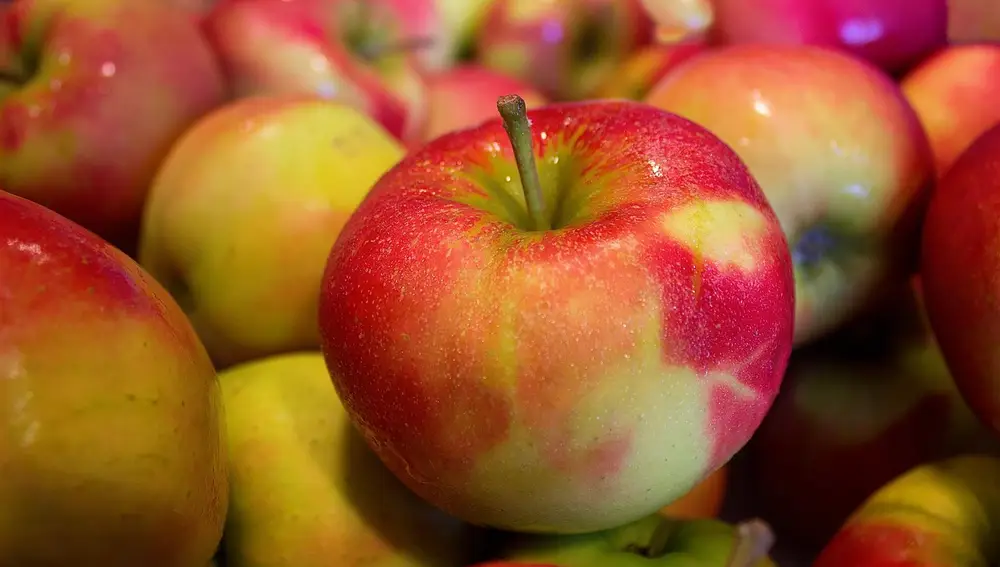In English, there is a saying that says “an apple a day keeps the doctor away” and what it means “An apple a day keeps the doctor away”. Now, new research published in the American Journal of Clinical Nutrition may prove that claim to be right, as a group of scientists from the Harvard University studied the substance that makes this fruit so healthy, even determining how many to take per day and what benefits they have to prevent some consequences of old age or “aging”.
To the applesIn addition to being present in stories of all times (from the Adam and Eve episode to stories like Snow White), they are very beneficial for our health. Among other things, because they are rich in phytochemicals and antioxidants and help reduce blood sugar levels. They also prevent cardiovascular problems or inflammation (arthritis or asthma) and, as icing on the cake, satisfy your appetite.
But new research has determined that the real hidden secret of apples is flavonol, a dietary compound that may reduce “elderly frailty,” a disease estimated to affect 10 to 15% of older adults, according to the study, although it may be underdiagnosed. In fact, 50% of the population aged 70-75 suffers from “pre-frailty”.
“Fragility” understood as a condition is characterized by decline in good functionality. Symptoms to detect frail elderly are generally falls, fractures, mobility and balance disorders or muscle weakness. Furthermore, this geriatric disorder is related to situations of disability and/or dependence.
In this sense, the flavonol can be a remedy natural to improve health and also helps to avoid this typical malaise of old age, according to the Harvard study. A key flavanol for combating brittleness is quercetina bitter-tasting compound found in fruits such as apples, but also in other foods listed below.
In fact, the work of Hebrew SeniorLife (HSL) at Harvard University, questions the main dietary recommendation to prevent frailtybased mainly on increased protein intake.

How many apples should we eat a day?
“Our findings suggest that for every 10 milligrams more flavonol intake per day, the odds of frailty were reduced by 20%,” the study authors write in a press release. Translated into apples, “individuals can easily consume 10 mg of flavonol intake per day as a medium sized apple it has around 10 mg of flavonols.”
“Although there was no significant association between total flavonoid intake and frailty, a higher intake of flavonoids (one of the subclasses of flavonoids) was associated with less likely to develop frailty“continue researchers Shivani Sahni and Courtney L. Millar.
“Specifically, the highest intake of quercetin was the flavonoid that had the strongest association with preventing frailty. These data suggest that there may be specific subclasses of flavonoids that have Greater potential as a dietary strategy for the prevention of fragility”.
What foods contain the flavonol quercetin?
In addition to the apple, there are other foods that contain quercetinsuch as berries (including various types of blackberries and berries), grapes, onions, shallots, capers, tomatoes, honey, seeds, dried fruits (such as nuts), flowers, tree bark, leaves, wines and teas.

Frailty can begin at age 40
Although you may think that frailty is a disorder that only affects older people, a study reveals that it can begin as early as 40. Researchers at Flinders University discovered that “pre-fragility” appears in surprising 45% of people aged 40 to 49. That's about the same percentage of older people who experience it.
“You don’t have to be 70 or 80 years old to be on the path to fragility. Age doesn’t matter,” Sue Gordon, Flinders professor and chair of Restorative Care in Aging, said in a university statement. “The success of interventions for healthy aging and self-management should begin at least in the fourth decade of lifefocusing on those factors that contribute to pre-frailty and frailty.”
So Harvard researchers encourage eating more apples and other plant-based foods. Likewise, they warn of the need to continue analyzing the role of diet in this and other diseases, as this article is one of the first studies who comprehensively examine the role of dietary flavonoids in preventing frailty.
